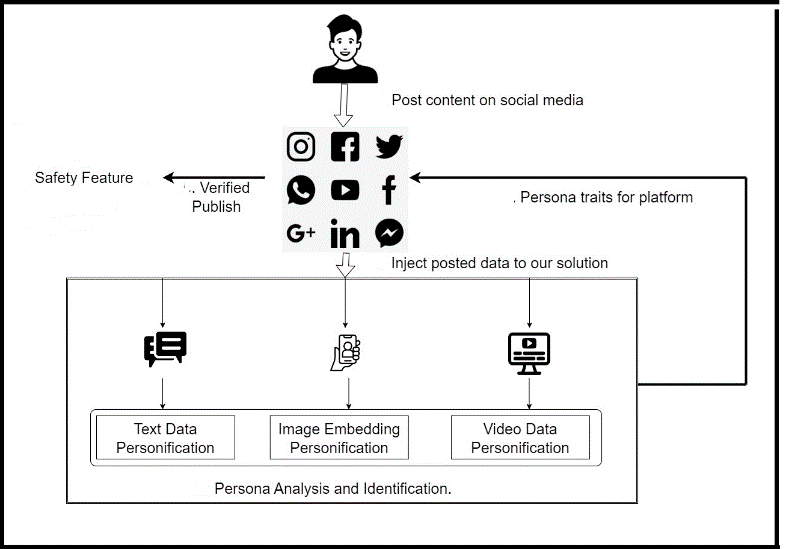Recommendations in Social Media Applications to Ensure Personification and Safety using Machine Learning
Main Article Content
Abstract
Myriads of social media utilization lead to various issues like personalization hacks, data security problems, and safety. A recommendation is of paramount importance to alleviate this problem when there is a huge amount of data and the number of participants on the platform is increasing exponentially. Unfortunately, modern social media research has enhanced the performance and personalization of recommendations in many fields, yet largely underutilizes the power of artificial intelligence to enable personalized recommendations system for social media platforms like WhatsApp, Facebook, Twitter, etc. With advancement inside the global of technology every hour and every day new features are delivered to the list. In a manner, social platforms are merging into our actual existence, and to achieve personification and related safety, users can get any one safety factor from all 6 classes with this approach. This factor provides the basis for personification and the implementation of safety precautions.
This research proposes recommendations for personification in social media applications. The proposed Modified Inception Resnet V4 Convolutional Neural Network (MInReCNN) outperforms embedded media persona analysis and classification through text, image, and video data. Using these prediction classes better decisions can be made in given social media domain.
Article Details
References
Koosha Zarei, Reza Farahbakhsh, and Noel Crespi.,"Deep dive on politician impersonating accounts in social media.", IEEE Symposium on Computers and Communications (ISCC), Barcelona, Spain, June 2019, PP:1-6.
V. A. Fitri, R. Andreswari, M. A. Hasibuan., "Sentiment analysis of social media twitter with case of antilgbt campaign in Indonesia using naive bayes, decision tree, and random forest algorithm." Procedia CS, 2019, PP: 765-772.
Wen Wu, Li Chen, and Liang He.,"Using personality to adjust diversity in recommender systems.", In Proceedings of the 24th ACM conference on hypertext and social media. ACM," 2013, PP: 225-229.
Prof. Madhuri Zambre. (2016). Analysis and Modeling of Physical Stratum for Power Line Communication. International Journal of New Practices in Management and Engineering, 5(01), 08 - 13. Retrieved from http://ijnpme.org/index.php/IJNPME/article/view/42
L. R, W. S and C. KC,"Multiple location profiling for users, relationships from social network and content, Proceedings of the VLDB Endowment, Iss. 5, vol.11," 2011, PP: 1603-1614.
Oren B., Avi C., et.al," Attentive Item2vec: Neural Attentive User Representations". IEEE Proceedings, International Conf. on Acoustics, Speech, Signal Processing (ICASSP)"2020, PP: 3377-3381.
Niels van de Ven, Aniek Bogaert, Alec Serlie, Mark J. Brandt, Jaap J.A. Denisen, "Personality perception based on LinkedIn profiles", Journal of Managerial Psychology, Vol. 32 Issue: 6, 2017, PP: 418-429.
Majumder N., Poria S., et.al. "Deep Learning-Based Document Modeling for Personality Detection from Text.", IEEE Intell. Syst. 2017, 32, PP: 74-79.
Denis Osipychev et.al.," Human intention-based collision avoidance for autonomous cars", IEEE American Control Conference (ACC), July 2017 ISSN: 2378-5861, PP: 2974-2979.
Aravind Kota Gopalakrishna et.al.,"Evaluating machine learning algorithms for applications with humans in the loop" IEEE 14th International Conf. on Networking, Sensing and Control (ICNSC)DOI: 10.1109/ICNSC 2017.8000136. Aug. 2017, PP:1-9.
Kumar, A. ., Reddy, M. P. ., Sushama, C. ., Limkar, S. ., Singh Kaswan, K. ., & Rathod, M. . (2023). Markov Clustering in Leaf Disease Detection Based on Classification using Probabilistic Naïve Bayes Regression for Deep Learning Architecture. International Journal of Intelligent Systems and Applications in Engineering, 11(3s), 184–188. Retrieved from https://ijisae.org/index.php/IJISAE/article/view/2559
Prema Gawade,"A Survey on Data Analytics for Personification using Machine Learning", Vol.-7, IJCSE, E-ISSN: 2347-2693, March 2019, PP.18-21.
Prema Gawade, Sarang Joshi., "Feature Selection for Embedded Media in the Context of Personification", ICIRCA proceedings in IEEE, ISBN: 978-1-7281-5375-9, July-2020, PP: 590-594.
Prema Gawade, Sarang Joshi, "Personification and Safety during pandemic of COVID19 using Machine Learning," Nov-2020, ICECA, Coimbatore, proceedings in IEEE, doi:10.1109/ICECA49313.2020.9297555., Dec-2020, PP: 1582-1587
Rossi, G., Nowak, K., Nielsen, M., García, A., & Silva, J. Enhancing Collaborative Learning in Engineering Education with Machine Learning. Kuwait Journal of Machine Learning, 1(2). Retrieved from http://kuwaitjournals.com/index.php/kjml/article/view/119
Prema Gawade, Sarang Joshi, "Persona Identification based on Social Media Profile Images for Personification and Safety", Webology, Volume 19, Number 1, January, 2022,DOI: 10.14704/WEB/V19I1/WEB19087, PP: 1297-1314.
A. Alsavat, H. EI-Sayed, “Social media analysis using optimized K-Means clustering”,June 2016, IEEE Int. Conf. SERA, doi: 10.1109/SERA.2016.7516129, PP: 1-6.
P. Sinha, L. Dey, et.al., “A Hierarchical Clustering Algorithm for Characterizing Social Media Users”, In Companion Proceedings of the Web Conference 2020 (WWW '20). Association for Computing Machinery, USA, PP: 353–362.

